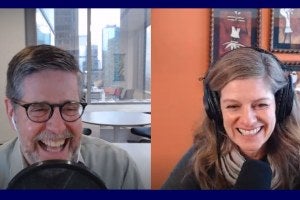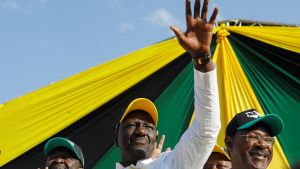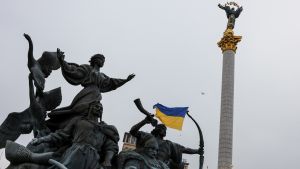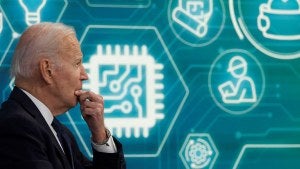Deep Dish Returns! Lessons on a Career Spent in Global Affairs
 Play Podcast
Play Podcast
About the Episode
Deep Dish is back after a brief break with a new theme song and some exciting news: occasional host Lizzy Shackelford is joining as an official co-host. To celebrate, Brian and Lizzy talk to each other and give you a chance to get to know them more personally. From what led them to a career grappling with global affairs to their hobbies and interests, we're exploring it all. Tune in to meet the hosts who bring you Deep Dish each week and get ready for a few surprises along the way!
Brian Hanson: This is Deep Dish on Global Affairs, a weekly podcast where we go beyond the headlines on critical issues around the world, and we explore how those issues are shaping US foreign policy. I'm Brian Hanson and I'm Vice President of Studies, which really means research, here at the Chicago Council on Global Affairs. And today, I'm joined by my frequent co-host and colleague at the council, Lizzy Shackelford, and Lizzy's a Senior fellow of US foreign policy here. Hey, Lizzy!
Lizzy Shackelford: Hey Brian, even though we both host Deep Dish, we don't often get a chance to talk to each other on the show. So, we realized that it might be a good time to introduce ourselves a bit more.
Brian Hanson: And we were talking the other day about how we both got involved in global affairs work, kind of what inspired us. And in each of our cases we've got a story about important events in our formative years that really propelled our interest in global affairs. And I believe yours was really 9/11.
Lizzy Shackelford: Yeah, I was actually, uh, living in South Africa when 9/11 happened. I'd recently graduated. I was an unpaid intern trying to make my way in Cape Town and that was obviously a really formative event for. all Americans at that time and really, meant a lot to the world. But for me, I got to see the reaction to it from South Africa. And this means a lot more to me now than it did then, but there was just this reaction even in the global South, where it was total empathy, it was support. I was working. I was often in the parliament in South Africa, and you know, people would just come up and voice their support and give me a hug. And, there was this feeling that like we were in it together with the rest of the world. And, you know, at that time I got so interested in the role that the United States could play. But then the next couple of years I watched as we completely dashed that sentiment. We launched the Global War on Terror. We undermined international law. As someone who is headed to law school and really interested in the rule of law, that background really made me start paying a lot more attention to what we were doing in the world. And, uh, you know, it made me kind of skeptical of our motives. So even though I would, many years later, end up on the inside of the government as a US foreign service officer in representing the US overseas, that backdrop both kind of shaped the foreign policy world I was working in and made me really someone who liked to ask questions and push back more even on the inside. So it's definitely shaped that whole period that I've been in. And maybe we're starting to leave, the war on terror. I'm not sure.
Brian Hanson: So then after that experience, you actually did go to law school and became a lawyer for a while, afterward joining the State Department. what's that trajectory and what are some of the formative experiences while you were a foreign service officer that continued to shape your involvement in global affairs?
Lizzy Shackelford: Well, I worked as a lawyer for a bit, but even during my law school years, I knew that I wanted to get into something more. I was thinking international human rights related at the time. So I, went into, uh, big law because that's what you do when you come outta law school.
Brian Hanson: Because you have debt.
Lizzy Shackelford: Because you have debt. Because you wanna learn how to be a lawyer. And I was doing international commercial law, international trade law, you know, export controls. Really interesting stuff. If you're looking at the Ukraine war and our treatment of Russia. But at the time, I knew that the kind of commercial side of it wasn't what it was most interesting to me. So, I got an opportunity to go do some work as a advisor on a USAID project, with contractors. And that took me all over the world. Providing advice on, legal and regulatory environments in different countries. But what it really did was it gave me a chance to see US government positions around the world, the different players in it, get to know USAID, get to know the State Department and embassies. And that's where I decided, the core of policy seems to be in the State Department. So I wanted to get into that and that's when I decided to apply for the Foreign Service
Brian Hanson: And where did you serve?
Lizzy Shackelford: My first tour they sent me to Poland. it was a very different Poland than today, both politically and in terms of the issues in the region. It was, seemed like a very calm, stable place. I imagine it's a little bit more interesting these days. And then I returned to the African continent, which is where really my heart is on a lot of these issues. I served in South Sudan. I was there when the war broke out in 2013. Talk about formative experiences, that certainly was one. And then after that, I served in Washington DC in the State Department Operations Center, which is our 24-hour crisis center. Also the place where we managed the phone diplomacy of the Secretary of State. And then after that, because I'm a glutton for punishment, I went to Mogadishu and served in the US mission to Somalia, where we were in between Somalia and Kenya for a couple of years. So that was, my career, in the foreign service.
Brian Hanson: What motivated you to leave?
Lizzy Shackelford: Well, at the time, and I have to say it was during the Trump years. it wasn't for partisan reasons, but it was really policy reasons that drove me to resign. At the time you were getting criticism of our treatment of the State Department and our role in the world, even, from both sides of the island and Congress, but as a US foreign service officer, you're really prohibited from speaking out publicly about these things. You're committed to implementing, in that case, our foreign policy. And you don't really have a voice to the outside world. And I, I felt that there were things going on in the inside that were very dangerous in terms of, our national security interests in the world and what the American, people are expecting our government to do on their behalf. And so, a lot of it was very much related to my particular job in Somalia. There was the, Muslim travel ban. there was a rollback on civilian oversight of drone strikes. we were committing in Somalia. And so, based on being there, I decided that I would stay as long as I was certain I could do more good than harm in my position. And one day, I didn't feel like I could anymore, and so I decided to resign.
Brian Hanson: And when you left the State Department, you were really committed to continuing conversations about foreign policy. And when we met each other, you were doing a talk about your book here at the Council, and a colleague interviewed you and said, you gotta meet Lizzy because you have a position to do outreach to the rest of the country, expand our dialogue about global affairs, and to really get people to think about what the role of the US should be in the world. And this is what you were doing before this job even existed. So, could you talk a little bit about kind of that interim period and then why this opportunity here at the Council was so attractive for you?
Lizzy Shackelford: Well, sure. I mean, the, the opportunity of the Council was really attractive because it gave me an opportunity to actually get employed and paid to do what I was doing for free. Because when I left the foreign service, people were really interested in hearing my story. I was surprised by how much my resignation seemed to mean to a lot of people who were concerned about what was happening with the United States and with our role in the world. but I also recognized that people had no idea what we were doing in their name overseas. Family members would say, we're so proud of what you're doing. You're doing God's work. I was like, I'm not sure it's God's work, really. but I'm doing something and that I think. Americans should know more about. They understand the military. People have a lot of respect and, kind of sentimental feelings towards our military, but most people don't really understand what diplomats do or why it's important, When I came back, I decided to write a book, which was a great opportunity for me to reflect on both my path and the foreign service and really what the role of the US government you know, in our foreign policy, has been. And it gave me a platform and an opportunity to talk to people. So I was. traveling around, doing events, doing talks with schools, universities, community groups, and that was how I came across, the Council. But, for me it was really a labor of love. It was just thinking that it was really important that Americans got a chance to hear more about what we were doing on the front lines out in the world on their behalf, and why it should matter to them.
Brian Hanson: Yeah. Thanks for sharing that about your background.
Lizzy Shackelford: Well, Brian, you, had a different entry into, the foreign affairs landscape, a little bit earlier than mine. Um, and if I have it correct, I think the Vietnam War is something that really piqued your interest in foreign affairs, right?
Brian Hanson: Yeah, it was. You know, growing up in the sixties and early seventies, it was something that was on the news, and first realization that the US played a large role in the world and that what we did mattered. And there are a couple other things that happened, in those kind of late teen years and that was the Soviet invasion of Afghanistan, and our response and the fact that I was registering for the draft, uh, as a result of that, and then also the debates in the early eighties about nuclear weapons and the concern of escalation of nuclear arms races with the Soviet Union. And there was this movie called The Day After, which was a scenario of what happens the next day after nuclear war. And, out of all of this, I, I guess the things that really struck me were. the US plays an incredibly important part of the world, that the decisions that are made by the US affect lives, not only our lives, which is critically important, but the lives of people all around the world. And then another thing that really came through was that foreign policy is about making choices, And the choices that we make have consequences. So that basically set me up in a career, and I've been in five sectors of the economy, so I've pursued it in a lot of different ways, but in which I really wanted to engage in this process of trying to shape, influence, the choices that were made, because they were so clearly consequential in the world.
And after graduating from college, I marched off to Washington DC and was very fortunate, quickly became the foreign policy advisor for a US Senator. And this was back in the eighties. And the big issues I was involved with, there were proxy wars in Central America that were bloody and, really challenging. I was down there a lot. I saw a lot of people die. I saw these issues play out in that region.
Another thing I was involved in there that had a huge impact on me, and it relates to Poland, was the transition out of communism. And Chicago's got the largest Polish population outside of Warsaw. So, uh, my boss, who is Senator from Illinois, Senator Allen Dixon, was very involved in these issues, and I played a role traveling to Poland, working with members of Congress to try to have a unified approach to support the negotiations, round table negotiations that led to the transition. out of communism. So those were some of the things that, really I had a firsthand chance to, be involved with, and subsequently I've kind of gone on to play other roles. I left congress to join the private sector. John Deere came, uh, agriculture and construction equipment company, came and recruited me to be their number two person there in the Washington DC office. And this was time of the fall of the Soviet Union, the opening up of world economies in new ways.
And you know, for a company, how do you engage in that world and the reshaping of the international economy. I worked on environmental issues. We came in and said, you know, tractors aren't a regulated source of pollution and we think we ought to be regulated. So I really learned a lot about how the corporate sector engages and shapes and contributes to foreign policy and engagement in the world, and it was really powerful to me. And then after that, I had only intended to live in Washington, DC for like a year. And then, Can I go back to graduate school? Well, it took me nearly six to get to graduate school, but I headed off to MIT to go get a PhD in political science. And I came out of graduate school and started teaching at Northwestern right before 9/11 in 2001 started in August. and that was kind of the shaping environment in which I was, engaging a set of young people who are newly interested in global affairs in a different way.
Lizzy Shackelford: So Brian, I'm curious from where you sit, because you started out a Cold War eye, Um, how does it feel today to have so much of that after a couple of decades of feeling behind the ball, coming back to the fore again? And would you have guessed any of. two decades ago?
Brian Hanson: No, I wouldn't have guessed a lot of this. Um, you know, there was a long period of time where the whole set of nuclear issues, which so consumed me, and the possibility of nuclear conflict coming back. I, think one of the sad things is I don't think we know how to think about this. I think there's a whole generation of people who haven't really struggled with this, and it's just old folks like me who remember literally the terror of nuclear weapons, incredibly destructive, you know, use would be catastrophically awful. I think this needs to be, you know, back to one of the core forum policy issues that we address. It needs more attention than it's getting now.
Lizzy Shackelford: have one question about your time in Congress, just because, I mean that's a place I've, I've never worked. Do you have a sense of how engaged Americans were then and what was happening in the world and what our role was in it? Um, do you see any differences between that then and now?
Brian Hanson: there was a great deal of interest, and it was driven by events that brought it front and center into people's lives. So there were the wars in Central America that led to the Iran Contra affair, the diversion of material and weapons to Iran in exchange for dollars to be able to support the US proxies down in Latin America. The other thing that was going on is the Soviet Union was changing in front of us. and, you know, there was sensitivity in Congress, you gotta run for reelection. So there was sensitivity to what people thought. And it was a time of really kind of dynamic change. And there was public interest and involvement and, you know, somewhat similarly may be to today, where the Ukraine war has brought this home, but at the time, I mean, these wars in Central America were on our borders, right? Or, on Mexico's borders. but the rhetoric was about how we were being directly affected.
Lizzy Shackelford: And that seems like a good time to turn to a little bit of what the role of the Council is. When I first came to the Council, you know, I, I came to it because of the mission that it has to really educate people and raise awareness about global affairs issues and interest in it. But I also know that not a lot of people, particularly outside Chicago, are that aware of its existence or its mission. So, can you talk a little bit about that?
Brian Hanson: Yeah, let me give you a quick story because it's really interesting. The council was formed in 1922, and it was at a time that looks remarkably similar to today. So, what do I mean by that? I mean, in 1922, what are the major things going on? You've got declining powers, not the US at the time, but Great Britain. You've got rising powers of Germany, Japan. What are the major issues people are worried about? People are worried about war and peace, and will the rising powers lead to new wars? People are worried about immigration. One of the biggest issues as people are coming into the United States, it actually, there was a big backlash and a set of anti-immigrant legislation that didn't change till 1965. There was worry about trade and linkages in the global economy and how that makes us vulnerable.
One of the other huge issues which is aligned today is democracy losing out to authoritarianism. In that case, it was the new democracies in Europe created after World War II who were falling and becoming, you know, authoritarian states. which led to fascism and the forces that drove World War II. And there was a deep belief that the public matters, right? This is a through line for us. And that having an informed public is gonna shape the choices made and primarily through elections, right? American people pick their leaders, and different leaders turn the country in different ways, as we've seen over the last several decades. So the council was born in this environment to stimulate public debate, to bring people into foreign affairs, and to foster discussion, awareness of these issues. You fast forward to today, we have these exact same issues and we have the exact same mission. Which is to engage people in ways that they can relate to and understand and link to their own lives. We do it in a lot of different ways. This podcast is one of them. Deep Dish and Global Affairs is about extending that kind of debate.
Lizzy Shackelford: Speaking of this podcast, why don't we talk a little bit about, uh, how we come up with ideas for it?
Brian Hanson: Yeah, that's part of the fun that you and I have is batting around ideas. And you know, some of the things that we look for are a deeper context or understanding of stuff that people are hearing about in the news. So, lots of our listeners already know about what's going on, but what we try to do is, get underneath it and help understand the context and the deeper set of understandings. I like to call 'em deep dish moments. I'll give you an example of one, which was the issue that we did on Iraqi politics and, uh, guest argued very forcefully and for me convincingly that the fundamentally most important split in Iraqi politics is not Shia versus Sunni versus Kurds. It's not that sectarian mix. It's the elites versus the rest of the population. Essentially, the elites across those groups have made a deal in which they're benefiting, the population is losing. Caused me to think fundamentally different about the politics happening in Iraq. And what would you contribute? You're part of these conversations that we have when we're kicking around ideas and deciding what to do.
Lizzy Shackelford: Yeah, I mean, I would say it is really a fun part of it is deciding what we're going to focus on. And for me, uh, they're kind of two big buckets for me. I like bringing stories about parts of the world that people aren't necessarily paying a lot of attention to. A lot of a focus on the global south. One of the episodes that I really enjoyed doing was the one on Kenyan elections last August. I think people were vaguely aware there were elections happening, but they didn't understand what a big deal it is for democracy in that region and how important Kenya is to the trajectory there. We had a couple really great guests who could give both the historical perspective and could talk really about what was underway in Kenya at the time and what the outcome was gonna mean. I also really like picking topics that I wanna learn more about,
Brian Hanson: Mm. Mm-hmm.
Lizzy Shackelford: Because there are plenty of places around the world that, I'd like to get a deeper dive in as well. and for me those are really enjoyable. I know one of the shows that we've recently rerun was one of my favorite episodes about how women's role in society. reflects the status of national security in different states. And for me, I learned a lot from that topic as well. we've done some deep dives into the Balkans. In the Philippines these are topics that I don't necessarily, read a lot about or have a lot of background myself, but getting smart people that we get to hear from, is really fun as well.
Brian Hanson: The other thing that I think goes into the shows is who are those guests, right? Who can really illuminate the kind of angles that we wanna bring in, which is perspectives that people may not have heard ways that we can all learn together, and identifying those folks, getting to know those people, that's part of the fun as well.
Lizzy Shackelford: Of course, it doesn't always go as smoothly as we want. Brian, you've had a couple of experiences like that.
Brian Hanson: So I had two climate activists and I thought we were gonna have a conversation that was going to be of mutual reinforcing two people with similar views, cuz they agreed on about 90% of things. We recorded. And all they talked about was the 10 or 7% they disagreed on. And they got kind of nasty with each other. And the next day I get emails from both of them saying, uh, would it be possible for you not to broadcast that episode? And indeed, we respected that, because it wasn't very informative. It was like being in the middle of a fight among friends. So these things can happen.
Lizzy Shackelford: Yeah. That's kinda the challenge of trying to get different perspectives sometimes, but that doesn't often happen that way. But Brian, I've shared a couple of my favorite episodes. What might be one of yours?
Brian Hanson: One of my favorite episodes, and it's one of the ones that's had the greatest listenership, was an episode on Ukrainian history, Part of Putin's war has been framed on his interpretation of the relationship between Russia and Ukraine, and, had on a historian who is really fascinating and could bring to life a thousand years of Ukrainian history and why it matters and how it has shaped, this conflict. And my favorite story about that episode is my wife took the car to the garage and she was listening through Bluetooth in the radio. And she went in, and the mechanic gets into the car and, uh, you know, note down the mileage and stuff, and he comes in the little waiting area and says, what in the world are you listening to? That is so fascinating. So, for me, that was terrific, right? You've got somebody who was not tuning into Deep Dish, but stumbled into my wife's car where it was on and was really captivated by it. And it's some of those episodes too, that are, really compelling for me.
Before we go, I wanna do something that hopefully will be a little fun and Brene Brown, does this thing of a lightning round questions. And, hopefully this is going to reveal some of our aspects that go beyond our wonkiness, but maybe not. Maybe wonkiness does center us in ways that will be revealed. So what's the best, work-related book you've read recently?
Lizzy Shackelford: You know, I'm not sure the line between work related and non-work related gets really blurred I am a wonk. But I will say Prisoners of Geography by Tim Marshall What might be one of yours?
Brian Hanson: So it's actually one I read for Deep Dish and it is Chip War by Chris Miller, which is a great Deep Dish episode, by the way.
Lizzy Shackelford: Yes. All right. Best non-work-related book, if you ever read non-work related books.
Brian Hanson: I'm headed to South Africa, and I have been reading a lot of fiction to just try to help me understand the place. And one of the authors that I'm really enjoying is a guy by the name of Zekes Mda. And he's got two awesome books called The Heart of Redness and Ways of Dying.
Lizzy Shackelford: That's a good one. Um, non-work related. If I'm gonna get as far away from work as I can, it would be American Spy by Lauren Wilkinson. Really, really great read on a lot of levels.
Brian Hanson: The last show that you binged and loved.
Lizzy Shackelford: Sounds fairly predictable, but I've gotta say Ted Lasso, although I balance that out with The Last of Us, so I get that like happy/sad, constantly.
Brian Hanson: That's good. I mean, like you, Ted Lasso you know, it's one we've watched as a family. which makes it a favorite. And a film that you really love?
Lizzy Shackelford: Again, I'm a wonky nerd. Uh, Reds going back more of your time.
Brian Hanson: When I was in college!
Lizzy Shackelford: right? All right, what's a film that you love?
Brian Hanson: You're not gonna be surprised at one of my favorite films is Dr. Strangelove, which is about the nuclear world, and it is hilarious.
Uh, in a different direction, a concert that you'll never forget.
Lizzy Shackelford: I grew up, again, in Mississippi, a lot of country music down there. What can I say? Early Garth Brooks. It was, it was a show. It was phenomenal.
Brian Hanson: I'll never forget my first Bruce Springsteen concert. the born in the S eight, tour, uh, politically charged moment, really engaging in contemporary topics in a really powerful way. And he's a hell of a showman Like Garth Brooks. He's a hell of a showman
Lizzy Shackelford: Yes.
Brian Hanson: Absolutely. A favorite meal?
Lizzy Shackelford: My husband's homemade lasagna, complete with noodles from scratch.
Brian Hanson: Oh man, now I'm gonna have to cite something for my wife. because you did, you're with your husband.
Lizzy Shackelford: You don't have to, we won't tell her.
Brian Hanson: Well, she does listen to the show, so I'm in trouble. I'm going to cheat on this. Italian and French food. anything that comes out of either of those countries especially if it's got truffles on it.
Okay. gimme a snapshot of an ordinary moment in your life that brings you great joy.
Lizzy Shackelford: In the mornings. when my husband is here and we're able to have our coffee with our dogs. We're both foreign policy wonk, so we're just reading the news and, debating it. They sound nerdy, but they're very lovely moments. What might be one of yours?
Brian Hanson: You know, one of those is I love to play board games, And sitting together with my family now that I've got two adult children. When they will agree to play a game of Wingspan or some other game with me is one of the things I just love being together and, creating our own time together.
Lizzy Shackelford: That's a good one.
Brian Hanson: Um, I'm not even sure this is still a question anymore, but you used to ask, what are your top five Desert Island songs? You know, if you're trapped on a desert island, what are the five songs that you bring? But with streaming, I don't even know what the question means anymore, but any insight into that?
Lizzy Shackelford: I'll have to say, in the streaming world, I get less attached to songs than I used to. I think because, like growing up, you know, it was what you had on your…What do we call those things?
Brian Hanson: Turntable.
Lizzy Shackelford: Well, no, I'm not going back to your time, Brian. I'm going back to my time! All right. But a lot of these are gonna be dating. I feel like you can tell our, age from these things. Um, Cage the Elephant Whole Wide World. it was actually our procession song at our wedding. For those who don't know, I got married last year. Um, Florence and the Machines Dog Days are Over. I mean, can you be on an island these days without Taylor Swift?
Brian Hanson: I don't think you can be on the planet without Taylor Swift.
Lizzy Shackelford: But if I'm gonna do it, it's gonna be Shake it Off. Um, gotta have a little bit of blues. Uh, I think some BB King, maybe A Better World Somewhere, because if you're stuck on a desert island, that might be what you're thinking.
Brian Hanson: So I, I'm bad at this cuz I love music and I love all kinds of music. Uh, so I'm gonna just name some artists. There's a guy named Mark Erelli who has this incredible song, The Only Way, which is his response to 9/11. And, uh, as a person who's spent a lot of time in Chicago, I love John Prine and pretty much everything he's done, so we gotta put some in there. Uh, Aretha Franklin's a great place to go back to the roots and songs like, Respect. Um, but a little more recently, you know, Beyonce is someone who I have a huge respect for and really enjoy her work. And I'll give you one guilty, which again goes way back into my youth. there was a band in the seventies called Casey and the Sunshine Band, and they have a terrific throwaway, which has an earworm in it that I never can get outta my head. And it's called Boogie Shoes. So grab Spotify, go search Boogie shoes, and listen to that.
Lizzy Shackelford: Brian, you do recall that one of my dogs’ names is Boogie?
Brian Hanson: Oh yeah?
Lizzy Shackelford: I am aware of of all Boogie-related songs. I have practically an entire Boogie album, but yes, I would recommend that everyone pick that one up.
Brian Hanson: That's good. Well, Lizzy, this has been a fun, uh, getting a chance to talk, getting to share a little bit about ourselves with our listeners, who usually just hear us asking questions of other people and hopefully a little bit of understanding kind of who we are and what we bring to the show, why we're interested and engaged and doing it. I'm really looking forward to you becoming a more regular feature on Deep Dish and, really, joining me, in this co-host role. I think our listeners will benefit, too, by having, you know, the different things that we bring to the conversation.
Lizzy Shackelford: And to our listeners, we wanna hear more from you also. So please send us an email or better yet, a voice memo to deepdish@global affairs.org. You can suggest issues you'd like us to cover, guests you'd love to hear from, or you can just let us know how you think we.
Brian Hanson: And if you're looking for more Deep Dish in your podcast diet, tap the subscribe button on your podcast app so you can get each and every new episode as soon as it's released.
Lizzy Shackelford: You can find our show under Deep Dish on Global Affairs, wherever you listen to podcasts. If you think you know someone who would like today's episode, please tap, share, and send this to them.
Brian Hanson: I should also say that the opinions you heard today are those of. People who express them, you and me, and do not reflect the institutional positions of Chicago Council on Global Affairs. This episode is produced and edited by Kyra Dahring and mixed by Frank McCarran at Aphorism Productions here in Chicago.
Thank you for listening. I'm Brian Hanson.
Lizzy Shackelford: And I'm Lizzy Shackelford. We'll be back next week with a fresh slice of Deep Dish.




Related Episodes
 Global Politics
Global Politics
Experts Kathleen Klaus and Murithi Mutiga join Deep Dish to discuss the results of Kenya’s presidential election.
 Women and Girls
Women and Girls
To celebrate Women’s History Month, Valerie Hudson and Zoe Marks explain how women's rights shape national security and democracy.
 Defense and Security
Defense and Security
Putin claims he’s fixing a historic wrong in Ukraine. Historian Kathryn David joins Deep Dish to share the truth.
